On Jan. 23, China locked down Wuhan, capital of central China's Hubei Province and center of the novel coronavirus outbreak, in an unprecedented effort to curb the spread of the new infectious disease.
In the locked-down megacity, life goes on. Everyone has been racing against time to battle the epidemic.
WUHAN, Jan. 30 (Xinhua) -- More than one week after Wuhan was put on lockdown, the megacity with a population of over 10 million has been racing against time to battle the epidemic.
Zhang Dingyu is president of Wuhan Jinyintan Hospital, one of the city's designated hospitals to admit patients infected with the new virus. He has spent the past 30 days seeing and treating patients since the arrival of the first few cases of pneumonia caused by the novel coronavirus (2019-nCoV).
In the past week, going to bed at about 2 a.m. and getting up at about 4 a.m. has become the 57-year-old doctor's daily routine.
Wearing a protective cap and suit and putting on a face mask, Zhang clutches at the handrail as he slowly makes his way up and down the stairs. He was diagnosed with amyotrophic lateral sclerosis (ALS), also known as motor neuron disease, though he never revealed the state of his illness to his colleagues.
"I have never encountered such pressure as today," Zhang said. "For me, ALS is like a sword hanging in the air. I want to make a contribution with what limited time I have left."
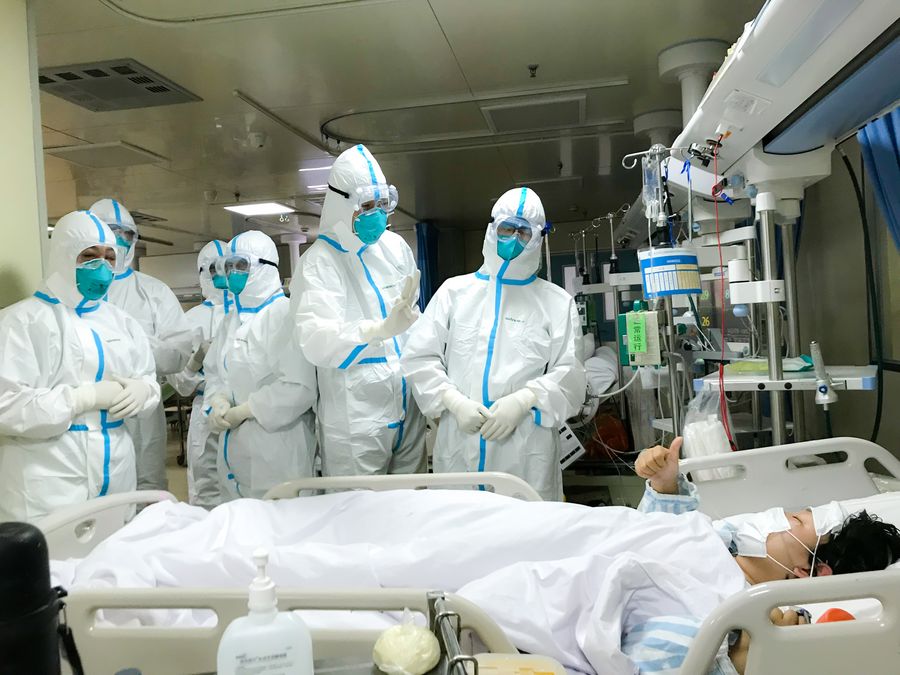
Members of the medical team of the Second Military Medical University receive praise from a patient at Hankou Hospital in Wuhan, central China's Hubei Province, Jan. 27, 2020. (Photo by Chen Jing/Xinhua)
He added that he has to quicken his pace to save time and indeed more patients.
His wife, also a medical worker, was infected with the novel coronavirus and was hospitalized on Jan. 19. Luckily, after medical treatment, she has now recovered.
Chinese health authorities announced Thursday that 7,711 confirmed cases of pneumonia caused by the novel coronavirus had been reported in 31 provincial-level regions and the Xinjiang Production and Construction Corps by the end of Wednesday. A total of 170 people have died of the disease.
The National Health Commission said in its daily report that 1,370 patients remained in critical condition, and 12,167 people were suspected of being infected with the virus as of the end of Wednesday.
Wuhan, capital of central China's Hubei Province and center of the coronavirus outbreak, reported 356 new confirmed cases and 25 new deaths on Wednesday, the provincial health authorities said.
On Jan. 23, China locked down the city in an unprecedented effort to curb the spread of the new infectious disease.
At present, Hubei has 131 designated hospitals, including 30 in Wuhan and another 101 distributed in the counties and cities of the province, for confirmed and suspected new pneumonia patients, according to Liu Yingzi, director of the Hubei Provincial Health Commission.
Liu said that more than 170,000 local medical workers are now fighting the epidemic and 6,097 more from 29 provincial-level regions and the military had also joined by Tuesday.
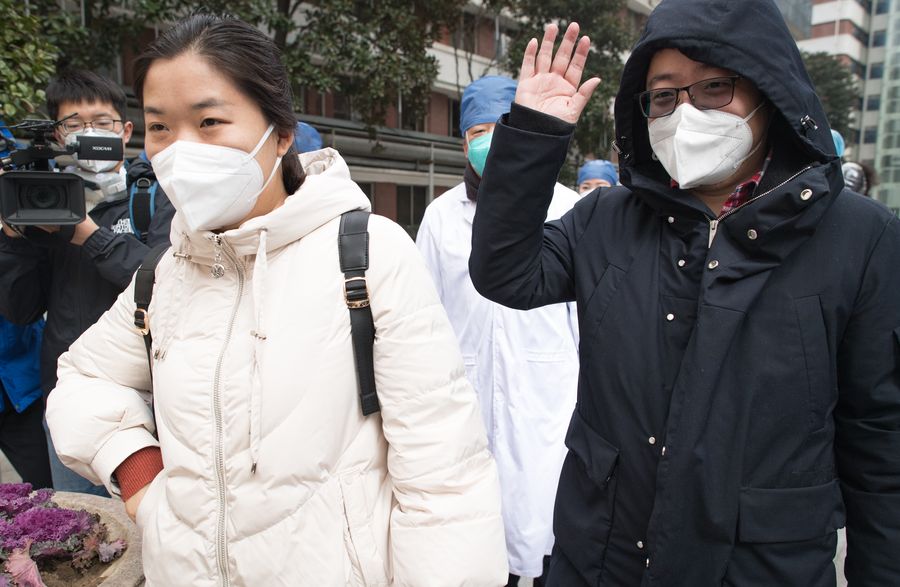
Medical workers diagnosed with the novel coronavirus (2019-nCoV) pneumonia are cured and discharged from a hospital in Wuhan, Jan. 28, 2020. (Xinhua/Xiao Yijiu)
MILITARY AT THE FRONTLINE
On the eve of the Chinese Lunar New Year, a traditional occasion for family reunions, Song Caiping left the comforts of home and family for Wuhan.
Song was among 450 military medical staff sent to Wuhan, including professionals who had experience in the fight against SARS and Ebola.
The medics, in three teams dispatched by medical universities of the army, navy and air force of the People's Liberation Army, arrived in Wuhan by military aircraft on Friday night. They were mobilized from various hospitals affiliated to the military universities. All of them volunteered for the mission.
As a member of the medical team from the Army Medical University, Song and her colleagues took charge of two inpatient areas with the help of doctors and nurses of Jinyintan Hospital. After three hours' preparation, they began receiving the first batch of 20 infected patients transferred there.
"We will stick to prevention and control in a scientific way and standardize the diagnosis process. We can definitely defeat the epidemic and win the battle," said Xu Dixiong, head of the medical team from the university.
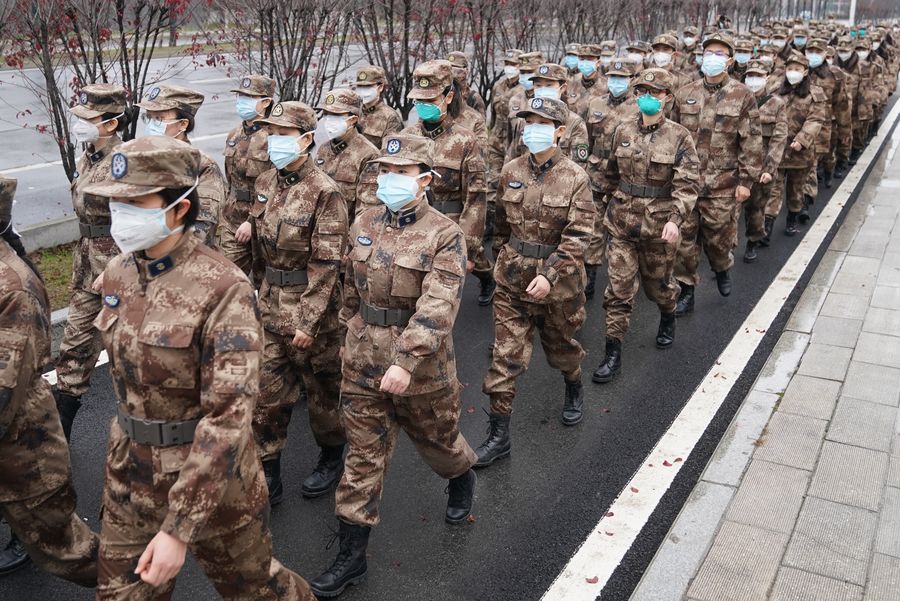
Members of a military medical team head for Wuhan Jinyintan Hospital in Wuhan, on Jan. 26, 2020. (Xinhua/Cheng Min)
At Hankou Hospital, a medical team from the Second Military Medical University took charge of the intensive care unit with 16 beds and newly opened an inpatient ward with 39 beds, rushing to treat critically ill patients with all-out efforts.
"We sent our best staff from various clinical departments. They have rich experience in battling contagious diseases," said Zhou Xianzhi, president of Air Force Medical University. "Some of them took part in major missions such as the battle against SARS and the fight against Ebola in Africa, as well as earthquake rescue missions."
RAPID HOSPITAL CONSTRUCTION
Following Beijing's SARS treatment model, Wuhan is building two hospitals to treat pneumonia patients infected with the novel coronavirus. The two facilities are expected to be put into use on Feb. 3 and Feb. 5, respectively.
Workers, trucks, and excavators are racing against the clock to meet the deadline at the construction sites.
At around 6 p.m. Wednesday, construction of power facilities at Leishenshan (Thunder God Mountain) Hospital, one of the hospitals, was completed.
In only three days, more than 300 workers toiled around the clock to install and adjust 7-km-long high-voltage cables and 26 supporting facilities.
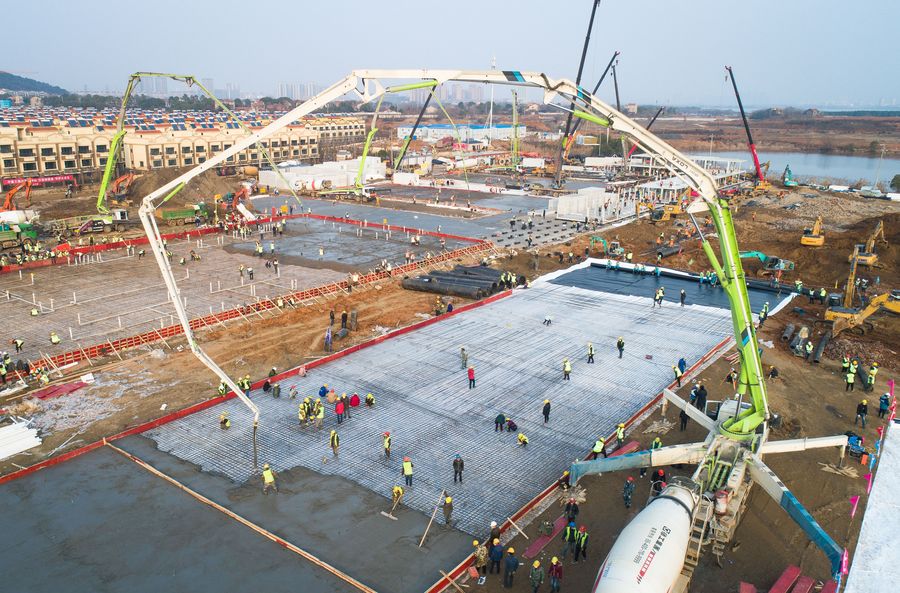
Aerial photo taken on Jan. 28, 2020 shows the construction site of Huoshenshan Hospital in Wuhan. (Xinhua/Xiao Yijiu)
The hospital will accommodate 1,600 beds, 300 more than the previous design, as the number of local patients increases. It is expected to expand to 60,000 square meters and provide working space to over 2,000 medical staff.
More than 4,000 workers and around 1,000 vehicles and large pieces of machinery have been toiling away at the Huoshenshan (Fire God Mountain) Hospital site day and night. Around 400 prefab rooms have been finished so far. The main pipeline of the drainage system in the hospital site is largely complete.
LIFE UNDER LOCKDOWN
In locked-down Wuhan, life goes on. Medical supplies, vegetables and other daily necessities are brought in. Residents are consistently reminded to steer clear of the virus.
A Wuhan resident in his 50s surnamed Zhang said he lost his mother on Jan. 25, the first day of the Chinese Lunar New Year. Under the lockdown, Zhang's family is unable to hold a memorial ceremony.
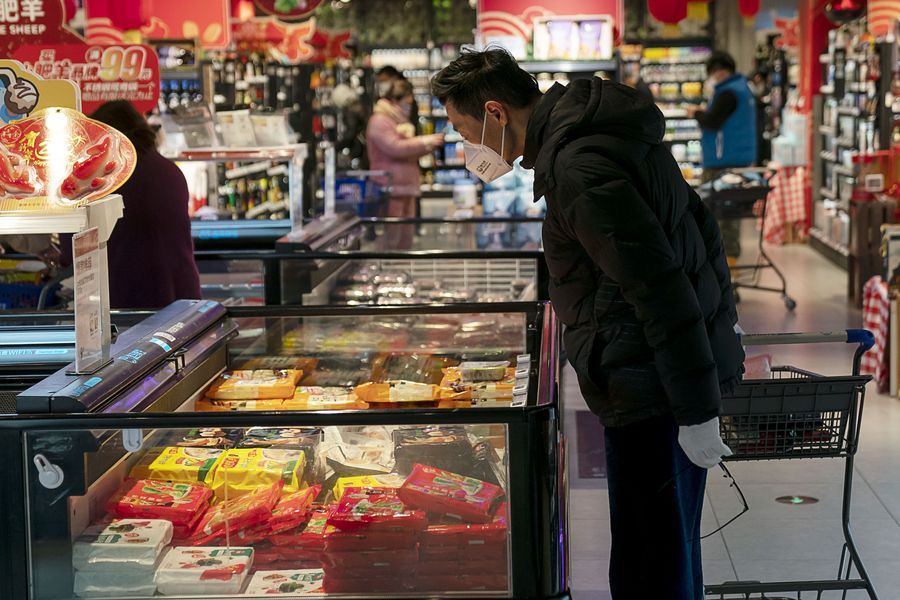
Residents shop at a supermarket in Wuhan, Jan. 27, 2020. (Xinhua/Xiong Qi)
"Amid this unfortunate epidemic, the only gratifying thing is that I could accompany my mother in her last days," Zhang said. He kept the clothes of his mother to remember her and set up an online chat group to share messages of mourning from relatives.
"After my mother left, it suddenly dawned on me that nothing is that important. The disaster also made my son realize the meaning and value of life," he said.
Sorrow and repentance can translate into confidence and strength to win this unprecedented battle.
A hotline was opened Thursday in Hubei Province to help people maintain psychological health amid the novel coronavirus outbreak. An official WeChat account has also been set up to provide 24-hour service.
The nation is currently experiencing a peak period of confirmed cases. With prevention and control measures in place, the number of future infections will be significantly reduced, said Li Lanjuan, a renowned Chinese epidemiologist.
"As of Wednesday, we have isolated five strains of the virus, two of which are very suitable for vaccine development," Li said. "It will take at least three months to prove a vaccine for the novel coronavirus is effective."
(Reporting by Cheng Lu, Lu Yifan, Lou Chen, Tang Weibin, Liao Jun, Qu Ting, Li Jingfeng, Li Changzheng, Liang Jianqiang, Yu Pei, Yue Wenwan, Yin Xiaosheng, Yu Wan, Ma Jian, Gu Xiaoli, Li Yun, Jia Qilong and Liu Yi; Video reporters: Yu Guoqing, Yang Zhigang, Xu Yang, Dong Bohan, Rao Rao, Wang Siban, Pan Zhiwei, Fang Yadong, Xiao Yijiu, Xiong Qi and Li Yun; Video editors: Jia Xiaotong.)■



